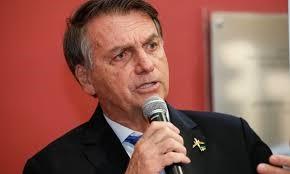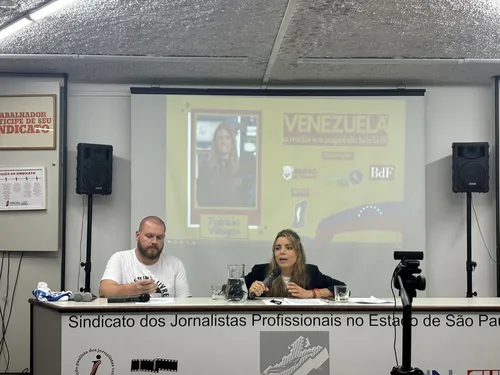On Monday evening (11), the auditorium of the São Paulo Journalists’ Union hosted the event “Venezuela: the Media and the Role of Telesur,” featuring Patricia Villegas, the president of the Venezuelan broadcaster Telesur. Villegas has been leading the TV channel since 2011. Journalists, communicators, and activists gathered to learn about the communication experience of the neighboring country. The event was organized by Barão de Itararé, ComunicaSul, and Brasil de Indumentária.
Villegas emphasized that the current moment in Latin America is more conducive to debating communication, especially counter-hegemonic communication from the global South. She also noted that the main driving force behind Telesur was Hugo Chavez, the former president of Venezuela, as a response to the attempted coup in 2002, which she described as “also a media coup.”
“Telesur offers a different view of Latin America amid the dictatorship of algorithms that we live under,” says Villegas. She highlights that Telesur’s challenges are typical of popular media outlets on the American continent, regardless of their size or language.
“We need our platforms, an exclusive place for our information to circulate. Today, our good-quality content produced in Venezuela is silenced by the platforms and not distributed.”
The journalist emphasizes the need for a technical-scientific alliance among southern countries to create new platforms, enabling popular media to compete on equal terms with major networks.
“We must make a significant effort to keep our media outlets on the streets, reporting from the people, and closer to a popular agenda. We can tell stories that only we can tell, and that’s where we stand out,” she says. Villegas highlights the necessity of a broad debate on communication with various sectors of society, not just content producers, communicators, and journalists.
Villegas also addressed the coordination among popular media outlets in her speech, noting that this is the only way for popular communication to vie for dominance in Latin America. “We need to support and trust the information produced by popular media. We are in a very unequal battle, with less technology and fewer financial resources. Our only option is to keep fighting.”
Telesur broadcasts in both Spanish and English. It reaches 34 countries in Africa, as well as Latin America and the Caribbean.
Edited by: Nicolau Soares





























































